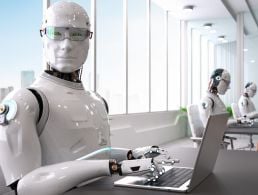At the opening of the fifth Workhuman conference, CEO Eric Mosley announced that companies of any size will now be able to use Workhuman’s social recognition platform.
As thousands of leaders, influencers and HR professionals settled in front of the main stage of the fifth Workhuman conference yesterday (19 March), Workhuman CEO Eric Mosley graced the stage to announce the company’s plans for the coming year.
To a packed hotel ballroom in Nashville, Tennessee, Mosley announced that from now on, companies of any and all sizes will be able to use a version of Workhuman’s social recognition platform.
When I sat down with Mosley later that day, he told me that up until now, the Workhuman platform was a direct sales model for large enterprises. Every week, dozens of small- to medium-sized companies were visiting the website but going away empty-handed.
Now, a version of the platform exists that is suitable for someone to create their own recognition programme of any size. The new options have multiple tiers and the cost is related to the features each tier has, including a free try-it-out version.
“The amount of employees doesn’t matter. The fact that they are human beings and have core human needs is what matters,” he said. “From this point on, there is no company of any size that will be left behind.”
‘An oasis of positivity’
Human beings have a core need for certain things. Mosley said the main two needs companies should be cognisant of are the need for positive reinforcement and appreciation as well as the need for connection.
Mosley said companies need to ensure there’s a community where their workers feel connected to each other. Employees are more engaged when they have a friend in work and companies that foster that kind of environment have more powerful cultures.
It’s important to make sure there’s a facility for employees to officially thank one another. “Give that facility to the employees, don’t have it as a management-driven initiative.”
In the past, companies have implemented recognition programmes but, because they are management-driven, they can come across as forced or fake. For this reason, Mosley said it’s best to “get out of the way and give the power to the people”.
When control of a recognition programme is given to the employees, it becomes “an oasis of positivity in an organisation”.
‘Doing anything on an annual basis is kind of outmoded now’
– ERIC MOSLEY
Of course, there is a danger of small blind spots within the oasis of positivity. While peer recognition can go viral among employees, what about those who get left out of the loop?
“There are certainly job roles or job descriptions where they may work from a remote office, they may not be connected to other people, they don’t work in project teams for example, and there’s no doubt that they might get lost,” said Mosley.
However, he said this is where a software recognition platform with analytics will be able to highlight where employees have been left behind.
“That person who may have slipped through the cracks, they also have the human need for positive reinforcement,” he said. “If they’re not to become disillusioned or cynical or bitter over time, then somebody has to give them positive reinforcement.”
With all of this peer recognition, is it time companies said goodbye to the annual performance review? Mosley said that because of the level of bureaucracy attached to the annual review, it has been quite resilient over time, even in the face of so many other workplace changes. In fact, because large companies attach their compensation cycles to them, they’re always going to be difficult to eradicate completely.
“However, the world of work has changed dramatically over the last number of years to become more social and ultimately just faster. Everything is faster so doing anything on an annual basis is kind of outmoded now,” he said. “Some remnant of that will still exist, especially in large companies, but it will be supplemented with something that’s more real-time, more frequent.”
How workplaces can make a societal impact
During his opening speech at the conference, Mosley also announced plans to roll out a new initiative to award companies that want to go above and beyond, to highlight their amazing workplaces.
Mosley told me that in order for companies to achieve this new certification, they will need to tackle the bigger societal issues and not just the common internal issues. These bigger issues include gender inequality, the right to privacy and different cultural aspects.
“A lot of companies do, with great energy, focus on those issues and they make real change for their employees in those companies, and therefore there is a knock-on impact on society,” he said.
“There’s been a dawning, I would say, that in the last couple of years the workplace is actually one of the most trusted environments for people and also maybe it’s the last great hope for tackling some of these societal level issues.”
Mosley said Workhuman works with some of the largest companies in the world, with approximately 4.5m employees live on the platform.
“If we can get a lot of those companies to focus on these issues, it will make a dent in these issues and it will proliferate through other companies,” he said.




